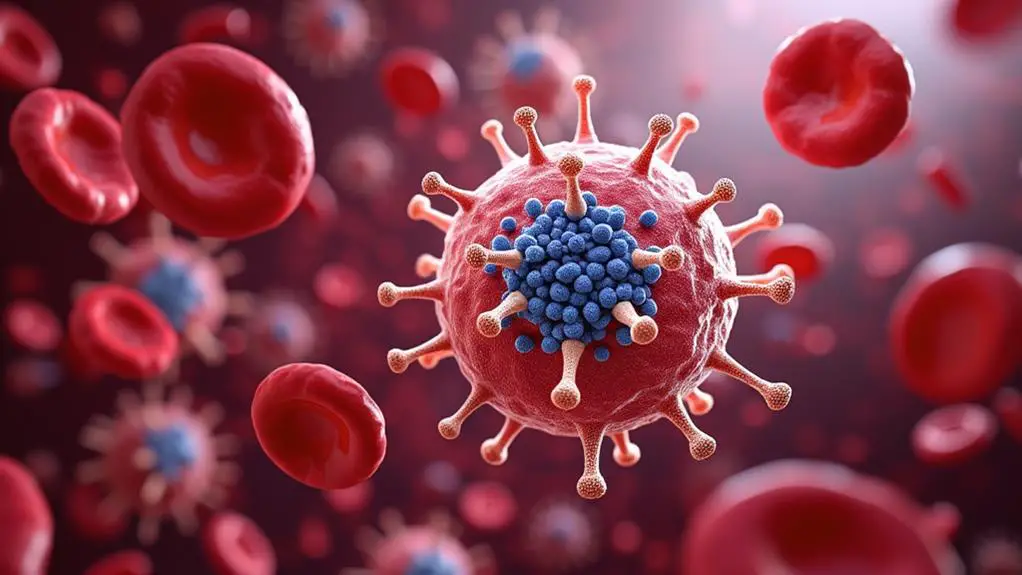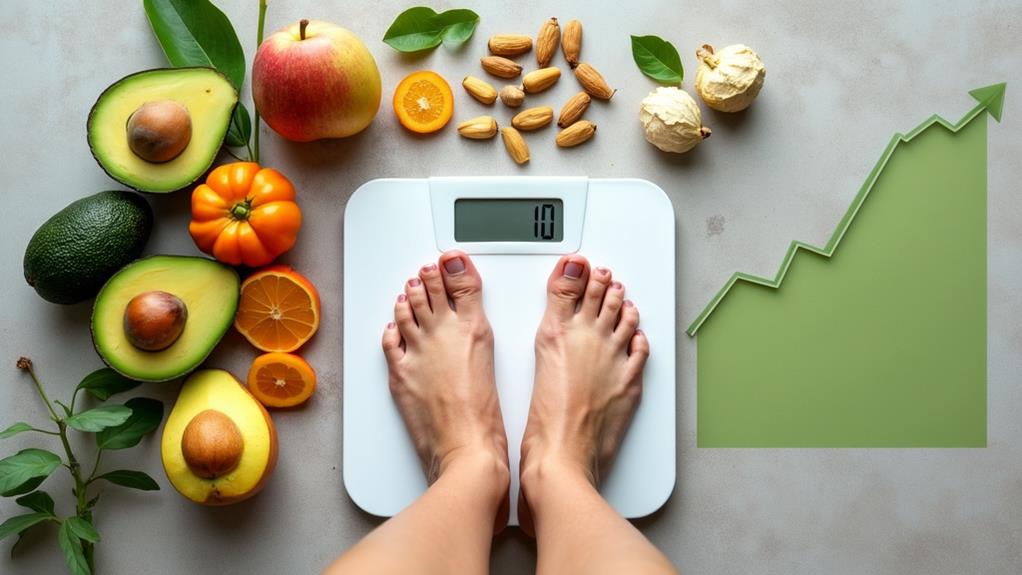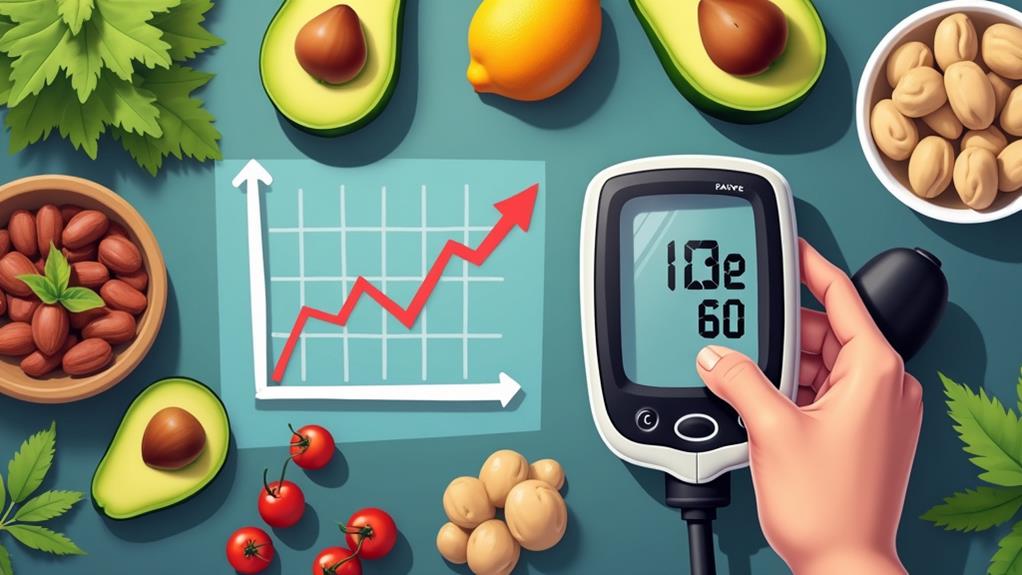
The ketogenic diet can lower blood pressure through multiple mechanisms, primarily by reducing insulin levels. Lower insulin decreases sodium retention in the kidneys, enhancing salt excretion, and consequently lowers blood volume. Additionally, the diet's natural diuretic effect reduces overall water retention, contributing to reduced blood pressure. Weight loss associated with the ketogenic diet further aids hypertension reduction by diminishing cardiovascular strain. To manage potential symptoms of low blood pressure such as dizziness, guarantee adequate hydration and appropriate salt intake. Understanding these effects can offer insights into effectively managing blood pressure on a ketogenic diet. Explore the thorough workings of this dietary approach.
Key Takeaways
- The ketogenic diet lowers insulin levels, reducing sodium retention and promoting salt excretion, which decreases blood volume and blood pressure.
- A natural diuretic effect from the diet increases urination, reducing water retention and blood volume, thus lowering blood pressure.
- Weight loss from the ketogenic diet reduces cardiovascular strain, contributing to lower blood pressure.
- Improved insulin sensitivity on the keto diet is linked to decreased hypertension risk and better metabolic health.
- Adequate potassium intake helps balance sodium levels and regulates blood pressure on a ketogenic diet.
Understanding the Ketogenic Diet
A ketogenic diet's core principle revolves around considerably reducing carbohydrate intake while increasing fat consumption to induce ketosis, a metabolic state where the body uses fat instead of glucose as its primary energy source.
This dietary approach typically involves macronutrient ratios of 70-80% fat, 15-20% protein, and 5-10% carbohydrates. Such ratios are crucial as they guide individuals to adhere to the dietary guidelines necessary for achieving and maintaining ketosis.
The ketogenic diet is not only a tool for weight management but also shows promise in improving metabolic markers and offering therapeutic benefits for conditions like epilepsy and Type 2 diabetes.
By greatly lowering carbohydrate intake, the diet decreases insulin levels, which has a cascade of effects, including reduced sodium and water retention. This mechanism can lead to rapid weight loss and improved insulin sensitivity, both of which are pivotal in managing various health conditions.
Furthermore, the diet's ability to stabilize blood glucose levels and reduce pro-inflammatory markers is beneficial for cardiovascular health.
For sustained success, individuals should regularly monitor their dietary intake to guarantee they remain within the recommended macronutrient ratios. This consistent adherence helps maintain ketosis and supports potential long-term health benefits, including stable metabolic markers and overall well-being.
Mechanisms of Blood Pressure Reduction
The ketogenic diet facilitates blood pressure reduction through several key mechanisms, including the lowering of insulin levels, which decreases sodium retention and enhances salt excretion.
This process is essential for improved insulin sensitivity, which is often associated with better overall metabolic health. As the body adapts to nutritional ketosis, this leads to a decrease in water retention, reducing blood volume and consequently lowering blood pressure.
In addition, the diet's emphasis on potassium-rich foods aids in balancing sodium levels, contributing to improved blood pressure regulation.
Insulin and Potassium Reduction
Insulin's pivotal role in the body's metabolic processes extends to its influence on blood pressure regulation, particularly through its interaction with potassium. The insulin effects observed on a ketogenic diet include a significant decrease in insulin levels. This reduction impacts the kidneys' ability to reabsorb potassium, leading to altered potassium balance.
As insulin levels drop, potassium storage decreases, and more potassium is excreted from the body, a process that is essential in maintaining proper blood pressure levels. The reduction of insulin not only advances the ketogenic state but also supports cardiovascular health by promoting potassium balance.
Several mechanisms are involved in how this process aids in blood pressure regulation:
- Insulin level reduction lowers potassium reabsorption in kidneys.
- Decreased potassium storage due to increased excretion.
- Lowered blood volume from decreased water retention.
- Normalized blood pressure through balanced potassium levels.
- Enhanced fat metabolism, improving cardiovascular health.
These insights underscore the importance of monitoring potassium intake while on a keto diet to guarantee cardiovascular health is maintained.
Individuals considering a ketogenic diet should take these factors into account and potentially consult healthcare professionals to tailor dietary choices to their specific needs.
Water Retention Decrease
Water retention greatly influences blood pressure levels, making its reduction a vital factor in the benefits observed from a ketogenic diet. The ketogenic diet notably impacts the body's water balance through its influence on insulin levels.
With lower insulin levels, there is decreased renal retention of essential electrolytes such as potassium and sodium. These electrolyte shifts lead to a reduction in water retention, as sodium is a primary determinant of extracellular fluid volume. Consequently, this decrease in retained water contributes to a reduction in blood volume, thereby lowering blood pressure.
Furthermore, the ketogenic diet's diuretic effect promotes increased urination, expelling excess fluid from the body. This process is essential in regulating blood pressure, as excess fluid can contribute to heightened pressure levels. Studies have consistently shown considerable reductions in both systolic and diastolic pressure among individuals adhering to a ketogenic diet.
Given these changes, it becomes imperative for individuals on a ketogenic diet to maintain adequate hydration and monitor dietary salt intake. This approach helps to stabilize water balance and mitigate symptoms associated with low blood pressure, ensuring that the diet's cardiovascular benefits are maximized while avoiding potential adverse effects.
Blood Volume and Pressure
When following a ketogenic diet, reduced blood volume plays a critical role in lowering blood pressure. This diet leads to a decrease in insulin levels, which affects potassium storage and subsequently reduces blood volume. As blood volume decreases, there is a corresponding decline in blood pressure due to the body's lowered capacity to retain water, a natural diuretic effect of the keto diet. This change in blood volume is a primary mechanism of pressure regulation for individuals adopting this dietary approach.
Several factors contribute to these changes:
- Insulin Reduction: Lower insulin levels lead to decreased potassium storage, affecting blood volume.
- Water Retention: A low carbohydrate intake results in less water retention, aiding in blood pressure reduction.
- Diuretic Effect: The ketogenic diet's natural diuretic effect further decreases blood volume.
- Blood Pressure Impact: Studies show significant reductions in both systolic and diastolic blood pressure.
- Salt Intake: Adequate dietary salt becomes essential to counterbalance low blood pressure symptoms.
For individuals on a ketogenic diet, understanding these mechanisms can aid in effective blood pressure management.
Maintaining proper electrolyte balance, especially through sufficient salt intake, is crucial to support pressure regulation and prevent adverse effects associated with low blood pressure.
Insulin and Sodium Retention

Managing insulin levels is a essential component when evaluating the effects of a ketogenic diet on blood pressure, primarily due to its impact on sodium retention.
The ketogenic diet, characterized by low carbohydrate intake, considerably decreases insulin levels. This reduced insulin impact directly affects sodium balance by decreasing sodium reabsorption in the kidneys. Consequently, more sodium is excreted, resulting in lower water retention, a decrease in overall blood volume, and ultimately, a reduction in blood pressure.
It's important to note that during the initial phase of ketosis, individuals may experience symptoms like headaches and fatigue, commonly referred to as the keto flu. The effect of lower insulin levels on sodium retention is particularly pronounced during this initial phase of adopting a ketogenic diet. This period often sees a rapid drop in blood pressure due to the diuretic effect of increased sodium excretion.
It is essential for individuals on a ketogenic diet to evaluate these changes, as adjustments in dietary salt intake may be necessary to stabilize blood pressure levels effectively.
Research supports the notion that individuals following a ketogenic diet experience a more substantial reduction in blood pressure compared to those on higher-carbohydrate diets. This underscores the importance of insulin and sodium management in maintaining ideal blood pressure levels while following a ketogenic lifestyle.
Role of Hydration and Electrolytes
Having discussed the impact of insulin on sodium retention and its subsequent effect on blood pressure, it is essential to address the significance of hydration and electrolyte balance while following a ketogenic diet.
The reduction in carbohydrate intake on a keto diet results in decreased insulin levels, leading to increased sodium excretion and reduced water retention. This diuretic effect necessitates careful attention to hydration strategies to prevent dehydration and maintain cardiovascular health.
To mitigate the symptoms of keto flu, which include muscle cramps and dizziness, it's vital to guarantee an adequate intake of electrolytes through both diet and supplements. Additionally, regular consumption of foods like avocados, which are rich in potassium, can support muscle function and overall energy levels.
To achieve ideal hydration and electrolyte balance, consider the following practical measures:
- Increase water intake: As the body loses more fluids, maintaining adequate hydration is essential.
- Monitor electrolyte levels: Regularly check sodium and potassium levels to guarantee they remain within a healthy range.
- Incorporate electrolyte-rich foods: Foods such as avocados, nuts, and leafy greens can help replenish essential minerals.
- Consider supplements: Electrolyte supplements may be necessary to support hydration and prevent symptoms like dizziness or fatigue.
- Adjust salt intake: Increasing dietary salt can counteract the increased sodium excretion, helping stabilize blood pressure.
Impact of Weight Loss

The weight loss associated with a ketogenic diet often results from metabolic changes and the state of ketosis, where the body utilizes fat for energy instead of sugar. This process can facilitate significant reductions in blood pressure.
Improvements in insulin sensitivity, another benefit of the ketogenic approach, further enhance these effects by contributing to weight loss and reducing hypertension risk.
Studies indicate that the ketogenic diet can lead to improved blood sugar and triglyceride levels, which are beneficial for cardiovascular health.
Evidence suggests that even modest weight loss can meaningfully lower blood pressure, underscoring the importance of these physiological changes for cardiovascular health.
Metabolic Changes and Ketosis
Shifting to a ketogenic diet can lead to profound changes in metabolic processes that greatly influence weight loss and blood pressure regulation. The primary mechanism underlying these effects is the metabolic adaptation and energy shifts from carbohydrate-based energy to fat utilization. This change into ketosis promotes significant metabolic changes that support weight reduction and cardiovascular health.
As fat becomes the main energy source, the body experiences enhanced fat metabolism, which plays a critical role in weight loss. The reduction in body mass subsequently decreases cardiovascular strain, contributing to lower blood pressure.
Key metabolic changes observed during ketosis include:
- Shift from carbohydrate to fat as the primary energy source
- Enhanced fat metabolism leading to efficient energy utilization
- Decreased insulin levels, reducing water retention and promoting potassium excretion
- Improved caloric management due to decreased carbohydrate intake
- Reduction in both systolic and diastolic blood pressure linked to weight loss
These metabolic adaptations not only aid in weight loss but also improve overall metabolic markers, including blood pressure. The ketogenic diet's ability to induce ketosis and shift energy utilization offers practical benefits for cardiovascular health, making it a viable dietary approach for those aiming to manage their blood pressure effectively.
Insulin Sensitivity Improvements
Weight loss achieved through a ketogenic diet can markedly boost insulin sensitivity, an essential factor in effective blood sugar regulation. This improvement in insulin sensitivity is critical for reducing insulin resistance, a condition where cells become less responsive to insulin, leading to increased blood glucose levels.
By lowering carbohydrate intake, the ketogenic diet reduces insulin levels, thereby promoting metabolic flexibility—the body's ability to switch efficiently between burning carbohydrates and fats for energy. This metabolic shift not only aids in better regulation of blood sugar but also contributes to improved vascular function, enhancing blood vessel health and reducing vascular resistance.
Studies have demonstrated that individuals on a ketogenic diet often experience significant reductions in insulin levels compared to those adhering to higher-carb diets. This decrease in insulin promotes less sodium retention, which is beneficial for blood pressure control.
As a result, improved insulin sensitivity can lead to more effective kidney function and a reduced risk of developing hypertension. Consequently, the combination of weight loss and enhanced insulin sensitivity through a ketogenic diet represents a powerful strategy for achieving and maintaining lower blood pressure, thereby supporting overall cardiovascular health.
Managing Low Blood Pressure Symptoms
Shifting to a ketogenic diet can sometimes lead to a noticeable drop in blood pressure, prompting the need for effective management of associated symptoms. Common symptoms include dizziness, light-headedness, and even fainting, primarily due to reduced water retention and lower insulin levels.
This is similar to keto flu, where the body undergoes changes that can affect electrolyte balance, leading to discomfort. To alleviate these symptoms, incorporating practical strategies such as adjusting salt intake and hydration strategies is vital. Increasing dietary salt intake can help counteract low blood pressure, with options like salted bone broth being effective.
Simultaneously, staying well-hydrated is critical, as the ketogenic diet often promotes diuresis, leading to increased fluid loss and potential electrolyte imbalances.
Consider these practical steps to manage low blood pressure symptoms effectively:
- Rise slowly from sitting or lying positions to reduce the risk of postural hypotension.
- Increase dietary salt intake to help stabilize blood pressure levels.
- Guarantee adequate hydration to balance fluid loss and maintain electrolyte levels.
- Consult healthcare professionals for personalized advice, potentially including potassium supplementation.
- Discuss any necessary adjustments to blood pressure medications with a healthcare provider.
Importance of Monitoring Blood Pressure

For those commencing on a ketogenic diet, regular monitoring of blood pressure becomes an essential practice. This is due to the significant dietary adjustments inherent in a keto regimen, which can unpredictably lower blood pressure.
Individuals following a keto diet may also experience nutritional deficiencies, such as a lack of essential micronutrients like magnesium and potassium, which are vital for maintaining blood pressure balance. Continuous blood pressure monitoring is important to promptly identify any signs of hypotension, such as dizziness or faintness.
These symptoms often result from reduced insulin levels and decreased water retention, common effects of a keto diet. Frequent measurements enable individuals to maintain a thorough log of their blood pressure readings, facilitating the detection of trends over time.
This log is instrumental in guiding necessary dietary adjustments or medication modifications to stabilize blood pressure levels. It is also a significant preventative measure to avoid injuries from falls, particularly in older adults who are more vulnerable to the effects of low blood pressure.
Individuals experiencing symptoms of low blood pressure should seek guidance from healthcare providers to develop personalized management strategies. This proactive approach guarantees that any dietary changes are appropriately managed to maintain ideal blood pressure levels, thereby safeguarding overall health and minimizing risks associated with unsupervised dietary changes.
Personalized Dietary Approaches
Crafting personalized dietary approaches is essential for managing blood pressure effectively on a ketogenic diet. Dietary customization can help balance electrolytes, which is critical as the ketogenic diet often induces diuresis, leading to potential electrolyte imbalances.
Adjusting macronutrient ratios is a primary strategy to maximize health benefits while minimizing the risks of hypotension. Individuals should focus on tailoring their salt intake since adequate sodium is fundamental for maintaining stable blood pressure levels, especially during the initial shift to a low-carb diet.
Additionally, prioritization of high-quality fats such as monounsaturated fats from avocados and olive oil can support overall cardiovascular health. Incorporating potassium-rich foods or supplements may also be beneficial in maintaining electrolyte balance.
Engaging healthcare professionals in creating a customized dietary plan is advised, as they can consider individual health conditions and lifestyle factors. This guarantees that the adjustments made are both safe and effective. Regular monitoring of blood pressure is critical during dietary changes to promptly address any signs of low blood pressure.
Key considerations for dietary customization include:
- Adjusting macronutrient ratios for individual needs.
- Monitoring sodium intake to maintain blood pressure.
- Including potassium-rich foods to support electrolyte balance.
- Consulting healthcare professionals for tailored plans.
- Regularly tracking blood pressure to guarantee cardiovascular health.
These tailored strategies guarantee that personalized dietary approaches align with health goals.
Frequently Asked Questions
What Do Cardiologists Say About the Keto Diet?
Cardiologist insights suggest that keto benefits include improved insulin sensitivity and reduced blood pressure. They recommend personalized approaches, emphasizing careful monitoring and adequate salt intake to manage these effects, advocating the diet as a potential therapeutic option for hypertension.
Does Blood Pressure Drop When Dieting?
Dieting effects can lead to blood pressure fluctuations, particularly during low-carb regimens. Reduced insulin levels, weight loss, and increased diuresis contribute to this phenomenon. Monitoring and maintaining adequate sodium intake is recommended to manage potential blood pressure decreases effectively.
Does Eating Carbs Lower Blood Pressure?
The impact of carbohydrates on blood pressure is multifaceted. While lower-carb diets can reduce blood pressure, the effects of carb consumption vary. Diet effects depend on individual metabolic responses, with some experiencing different outcomes based on their unique physiological factors.
Can People With High Blood Pressure Do Keto?
Individuals with high blood pressure can consider the ketogenic diet, as its benefits include potential reductions in blood pressure. However, careful monitoring and professional consultation are advised to guarantee safe dietary adjustments and manage any possible adverse effects.
Conclusion
The ketogenic diet may contribute to a reduction in blood pressure through mechanisms involving decreased insulin levels, reduced sodium retention, and enhanced weight loss. Attention to hydration and electrolyte balance is essential in managing potential symptoms of low blood pressure. Regular monitoring of blood pressure is advised to guarantee safety and effectiveness of dietary interventions. A personalized dietary approach, considering individual needs and health status, is recommended to optimize outcomes while minimizing adverse effects.










No Comments